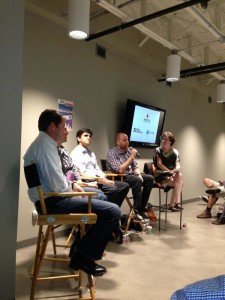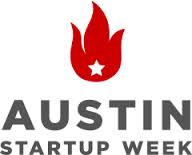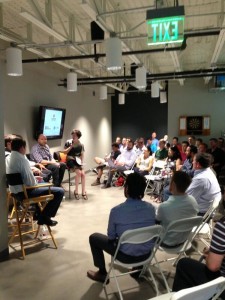By LAURA LOREK
Founder of Silicon Hills News
 Funded companies, which are performing well, get nice offices and free lunches for their employees, said Mike Dodd, partner with Austin Ventures.
Funded companies, which are performing well, get nice offices and free lunches for their employees, said Mike Dodd, partner with Austin Ventures.
Mass Relevance is one of its portfolio companies performing quite well. And on Wednesday, the company hosted a panel discussion about successfully raising capital for a startup company as part of Austin Startup Week.
The two-year-old company has grown from four employees to more than 120 employees and raised $5.5 million in a Series A round of funding and it already has millions in revenue from customers like NBC, MTV Networks and CNN. Its partners include Facebook and Twitter. Mass Relevance, formerly known as TweetRiver, aggregates social media content for its customers.
Claire England, executive director of RISE Austin, moderated the discussion, which paired two successful startup Co-founders with their lead investors. Eric Falcao, founder and Chief Technology Officer of Mass Relevance joined Dodd of Austin Ventures and Josh Kerr, Co-founder and CEO of Written teamed with Krishna Srinivasan, general partner at Live Oak Venture Partners.
Mass Relevance got early traction by landing a six-figure deal with MTV, said Falcao. And then the Co-founders brought on Sam Decker, formerly of BazaarVoice, as its CEO. He had connections with Austin Ventures. Mass Relevance got seed funding easily and raised its first round without a lot of trouble, Falcao said. Mass Relevance also went to California and received funding from Mike Maples Jr.’s Floodgate Partners, an early investor in Twitter.
Kerr bootstrapped his first two companies, but he wanted to build a really big company with Written, which markets bloggers’ content to brands, so he saw the need to get funding from the start. He was able to get a seed round from Live Oak Venture Partners.
“I wanted the structure that comes from raising money and the acceleration that comes with it,” Kerr said.
Signs of a successful startup
Next, England asked the venture capital investors to talk about the signs they look for when evaluating a startup investment, the warning signs of bad investments and top signs of good investments.
“This is such a people business,” said Srinivasan with Live Oak Partners. “I think that is the most important factor. We’re looking for people who have an insight from what they have done before.”
Live Oak Partners also looks for people they can work with and collaborate, Srinivasan said. The ones that don’t work out are entrepreneurs who are not collaborative and those that don’t want to be great partners, he said.
“It’s obviously team, team, team,” Dodd said.
 But Mass Relevance had a really great product and they were solving a problem of aggregating real-time Tweets for companies early on, Dodd said.
But Mass Relevance had a really great product and they were solving a problem of aggregating real-time Tweets for companies early on, Dodd said.
“What we try to do is look around the corner at the early markets,” Dodd said.
Austin Ventures saw Mass Relevance as being one of the big players in social media for television, Dodd said.
The importance of relationships
Next, England asked how often the companies and funders met and interacted with each other.
Falcao said he sees Dodd once every quarter, but that Dodd met with other executives, like Decker, on a more regular basis.
Dodd said he talked to Decker about once or twice a week. He joked he visited the Mass Relevance office often because they have free lunch for employees. His firm also helped in hiring some of the senior executives and helped to recruit people.
“We can get six head of sales literally almost over night,” he said.
Kerr said Srinivasan gives his seed stage company sage advice.
A good investor helps in team building and scaling the company much more aggressively, Srinivasan said.
England also asked if there was a downside in partnering with investors. The question was met with laughter and then a bit of awkward silence before Falcao answered.
“When things are going well, things are going well,” said Falcao. “VCs are good. They come with checks and advice and more checks. When things work, they work. So far, we haven’t gone through hardship. So it’s tough to point to anything.”
The downside is companies start to rely on them, Kerr said.
“They are bringing this really great value to the business. It’s not just money,” Kerr said. “It’s your buddy. It’s much, much more than that. But you’re not the only company they are invested in and you’re not getting 100 percent of their time. So the only downside is you might want more and not get it.”
What happens when things are not going well? England asked.
 “I have plenty that are not doing well,” Dodd said. “They don’t have offices like this. They don’t have free lunches. We focus on burn.”
“I have plenty that are not doing well,” Dodd said. “They don’t have offices like this. They don’t have free lunches. We focus on burn.”
Austin Ventures works to make sure they are focused on maximizing profit and minimizing losses and working to get market share in their industries, Dodd said. The relationship between the investor and the entrepreneur doesn’t change, he said. In a few cases, though, it has, he said.
“I still believe in what they are doing, it’s just taking longer than expected,” Dodd said.
Venture capitalists like to chase trends but it’s good to keep focused on the main business and not get distracted by whacky ideas and the latest trends, Falcao said.
“You need to ask yourself are we just chasing something new?” Falcao said. “You shouldn’t always do exactly what your customers want you to do. There’s something about staying on a mission and staying focused rather than chasing X.”
When a firm makes an investment and things don’t go as planned, the investors work to salvage the value and help hold the ship together to find an acquirer or to get some modest outcome, Srinivasan said.
“Those things take a lot of hard work,” he said.
Making the pitch to investors
 England then asked the entrepreneurs how they marketed themselves to potential investors.
England then asked the entrepreneurs how they marketed themselves to potential investors.
Kerr said when he pitched his company to Live Oak, Srinivasan sent him three really challenging questions in an e-mail message. He had time to think about the answers, but he couldn’t come up with the answers.
“Ultimately I ended up going back to him and saying these questions are too hard,” Kerr said.
At an early stage, the investment in the company is more about the people than the idea, and it’s better to be honest and admit when you don’t know something, Kerr said.
“If you don’t know the answer, you don’t know the answer,” he said.
Srinivasan said that he liked the honesty that Kerr displayed. He was able to evaluate the risk of investing in them and to gauge how much it would take to get the company to the next level, he said.
Startups should know how to answer basic questions from investors about customer acquisition costs and know how to scale, Falcao said.
“If you haven’t thought about that, you’re not thinking about how hard it is to scale a SMB (Small to Medium-Sized Business) company,” Falcao said.
How much money should startups ask for and how much time should they spend doing it?
The size of a check should be reflective of the stage of the company and issues it is facing, Srinivasan said.
“Just getting out of the gate, you’re going to raise a little bit of money,” Dodd said.
Typically, seed stage companies raise money from angel investors ranging from $350,000 to $1.2 million, Dodd said. A Series A round receives between $2.5 million and $7 million and a Series B round can get up to $20 million, he said.
Kerr said he spends 90 percent of his time raising money. His other partners focus on running the business.
The startup ecosystem in Austin
 England asked if Austin had a strong enough funding ecosystem to support startups.
England asked if Austin had a strong enough funding ecosystem to support startups.
Both Kerr and Falcao raised money from California from Floodgate Investments.
“More firms. We need more firms here,” Dodd said.
The ecosystem needs more sophisticated seed stage investors, he said. He said he wished there were three or four more firms like Live Oak to increase competition for funding, he said.
Raising second and third round funding is easy if a company is doing well, he said. But it’s harder to get people in the valley to invest in early stage companies, he said.
Austin needs more firms focused on early stage, Dodd said. More investment firms are good for Austin, he said.
“A rising tide floats all boats,” he said. “The more money that is in town, the better everyone will do.”
In the 30 years he has been in the market, this is the most vibrant and most exciting time, Srinivasan said. The quality of the ideas is really good, he said.
“Clearly this place can have more early stage companies,” he said.
The overall maturing of Austin’s startup ecosystem has contributed to Austin’s vibrant startup community, Srinivasan said. People who have been through the process a few times and transplants from California now populate it, he said.
“It’s a genealogy effect,” Dodd said. Successful companies spin out successful startups, he said.
Austin Ventures has funded three or four startups by people who left BazaarVoice, a company Austin Ventures backed that went public, Dodd said.
![]()
![]()
![]()
